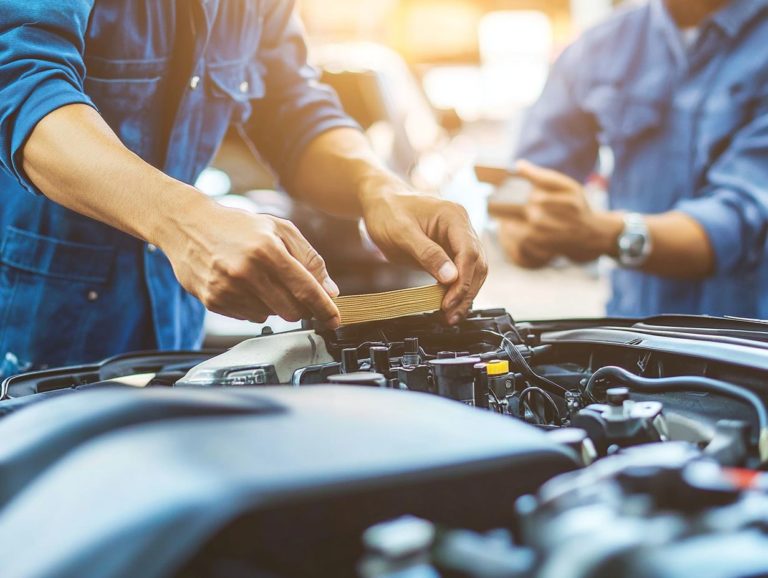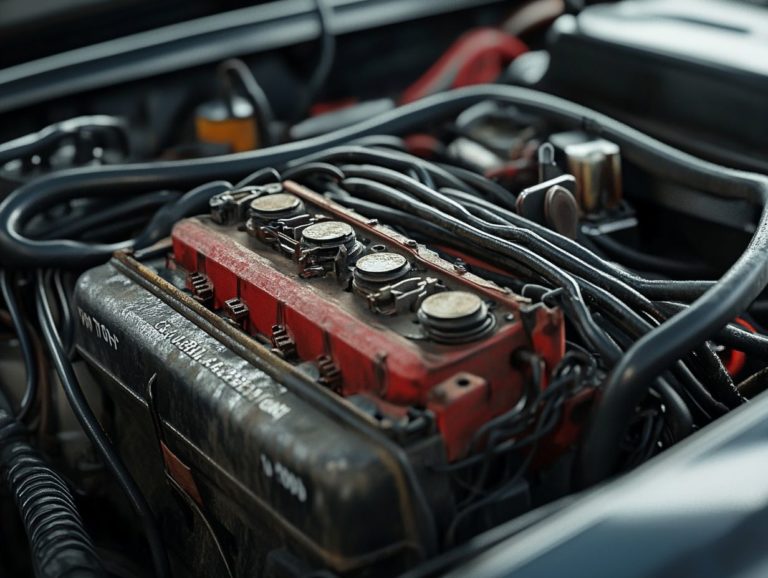Tips for Inspecting a Car’s HVAC System
Your car’s heating and air conditioning (HVAC) system is essential for ensuring a comfortable driving experience, creating a pleasant environment no matter what the weather throws at you.
Neglecting this critical component can result in various issues, ranging from unpleasant odors to inconsistent temperature regulation.
This article delves into what an HVAC system truly is and highlights the importance of regular inspections. It will also help you identify signs that something might be amiss.
You will find easy-to-follow guidance on how to inspect and maintain your system, ensuring that you remain comfortable on every journey.
Contents
- Key Takeaways:
- Understanding Your Car’s HVAC System
- Common Signs of HVAC System Issues
- How to Inspect Your Car’s HVAC System
- Maintenance Tips for Your Car’s HVAC System
- When to Seek Professional Help
- Frequently Asked Questions
- What are the key components of a car’s HVAC system?
- Why is it important to regularly inspect a car’s HVAC system?
- What should be checked during an inspection of a car’s HVAC system?
- How often should a car’s heating, ventilation, and air conditioning (HVAC) system be inspected?
- What are some signs that a car’s HVAC system may need to be repaired?
- Can I inspect my car’s HVAC system myself?
Key Takeaways:
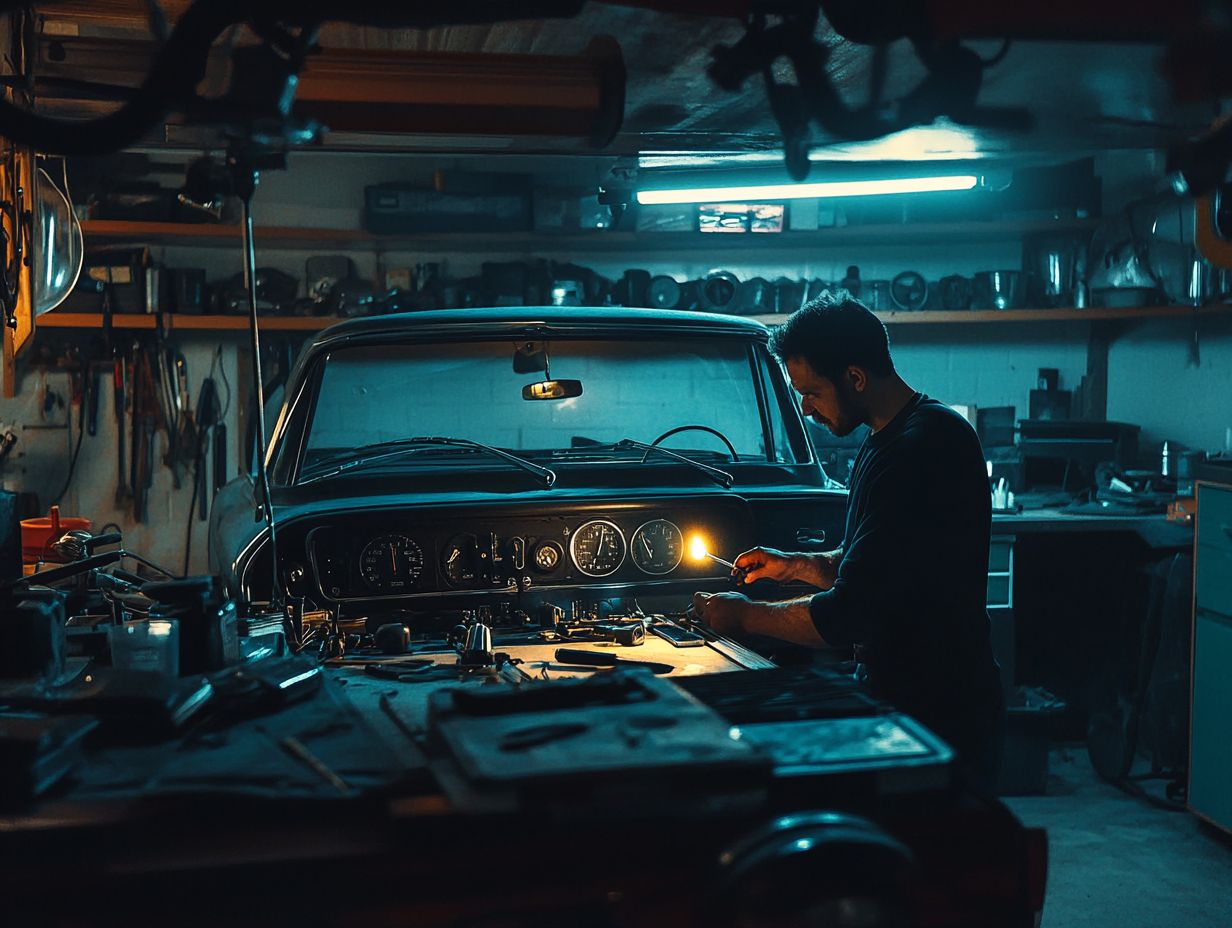
Inspect your car’s heating and air conditioning system regularly to avoid costly repairs. Watch for signs like strange noises and bad smells. Simple maintenance tasks can extend the life of your system and improve the air quality in your car.
Understanding Your Car’s HVAC System
Understanding your car’s heating and air conditioning system is essential for maintaining the ideal air quality and temperature control within your vehicle. This ensures comfort and safety for you and your passengers.
This system consists of various components like the compressor, condenser, evaporator, and sometimes alternative cooling fluids used in the system, such as R-134a and R-12.
Regular inspections and maintenance don t just help you spot common issues; they also ensure that the air delivery system is running efficiently. This enhances your overall driving experience in your vehicle.
What is an HVAC System?
An HVAC system, which stands for heating, ventilation, and air conditioning, is crucial for regulating temperature and maintaining air quality inside your vehicle. This intricate system features various components that work together to provide you with optimal comfort.
The compressor is essential, circulating refrigerant throughout the system, while the condenser takes on the critical task of dissipating heat to the outside, transforming refrigerant from a gas to a liquid.
On the flip side, the evaporator plays its part by absorbing heat from the interior, cooling the air that enters your cabin.
By seamlessly integrating these elements, the HVAC system not only ensures a comfortable temperature but also filters and refreshes the air. This significantly enhances your driving experience. Plus, it promotes health by reducing humidity and airborne contaminants, allowing you to enjoy every journey to the fullest.
Why is it Important to Inspect?
Regular inspections keep your HVAC system running smoothly. This proactive measure helps prevent potential issues that could lead to costly repairs or uncomfortable driving conditions.
By employing an inspection checklist during these evaluations, you can easily pinpoint critical factors, such as low refrigerant levels and high-side pressure.
This approach aids in diagnosing existing problems and significantly contributes to extending the lifespan of the entire system.
Routine inspections help maintain optimal performance, which directly enhances the air quality inside your vehicle. With consistent attention to your HVAC system, you can enjoy greater reliability, allowing you to breathe easier and experience a more comfortable ride.
Common Signs of HVAC System Issues
Being mindful of the common signs that indicate HVAC system issues is essential for any vehicle owner. By detecting problems early, you can ensure a consistently comfortable driving experience.
Pay attention to unusual noises, foul odors, and inconsistent temperature control these are red flags that warrant immediate attention and should never be overlooked.
Don t wait until it s too late start inspecting your HVAC system today!
Unusual Noises
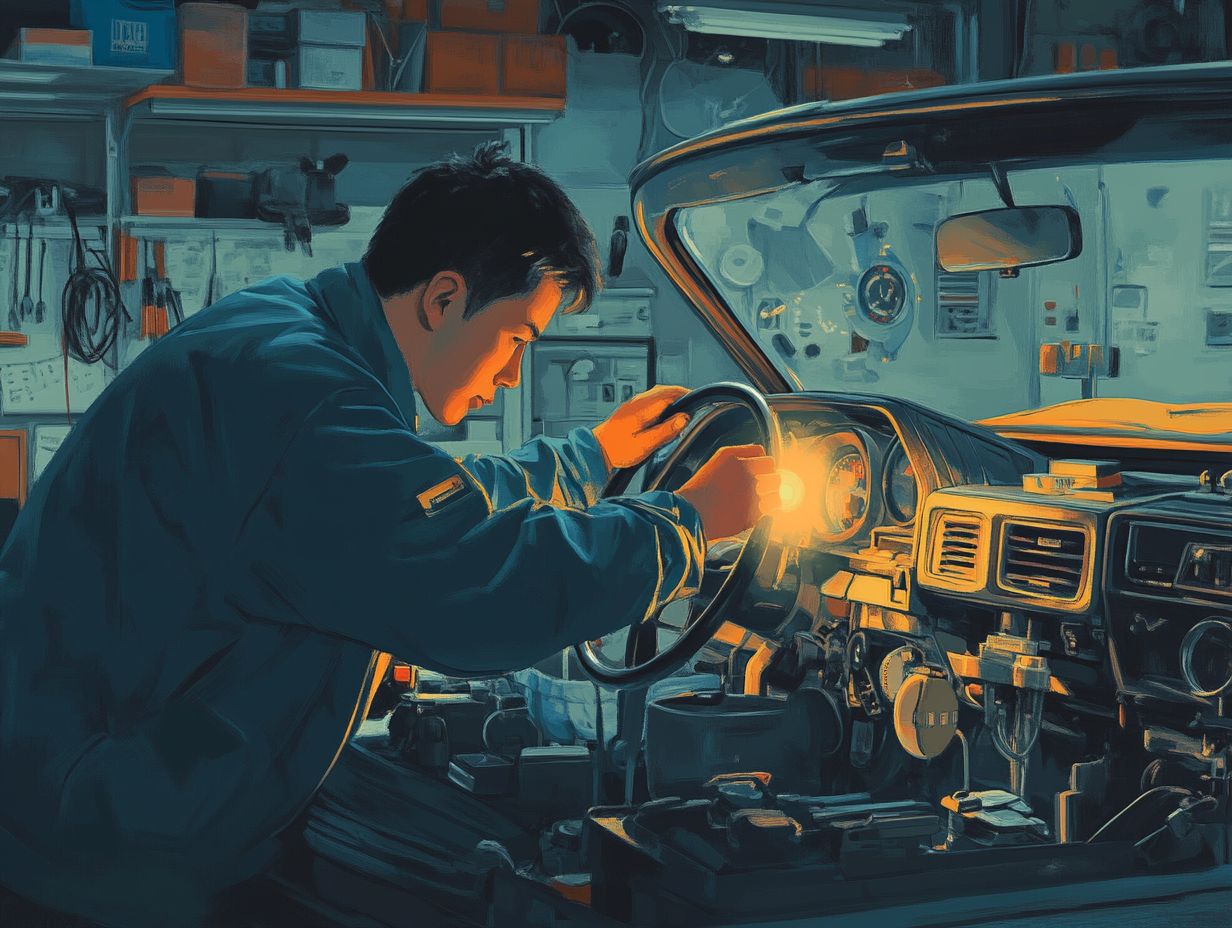
Unusual noises coming from your HVAC system can signal a range of issues. These may include a struggling compressor or fan speed complications.
You might hear grinding, squeaking, or hissing. Each sound hints at different underlying problems.
For example, a grinding noise often indicates that the compressor is having a tough time. This could be due to insufficient lubrication or bearing failure.
Squeaks could mean that the fan belts are worn out or misaligned. Hissing sounds might suggest refrigerant leaks or complications with the expansion valve.
Listen closely! These sounds warn you of potential HVAC problems. If left unchecked, they can lead to major repairs and discomfort on the road.
Foul Odors
Foul odors emanating from your vehicle’s HVAC system can signal the presence of mold or mildew. They may even indicate refrigerant leaks, all of which compromise cabin air quality.
These unpleasant smells ruin your driving experience. They may also hint at underlying issues that pose health risks.
Mold and mildew flourish in damp conditions and can lead to respiratory problems for anyone on board. Refrigerant leaks can also harm air quality, exposing you and your passengers to harmful chemicals.
Regular leak detection and HVAC system maintenance are essential. They ensure a safe and comfortable atmosphere within your vehicle.
By addressing these foul odors promptly, you can prevent further complications. This preserves air quality and the well-being of everyone inside.
Inconsistent Temperature Control
Inconsistent temperature control from your HVAC system may signal issues with the compressor or its mounts. It could also relate to the overall efficiency of the air conditioning unit.
Such irregularities can lead to fluctuating indoor temperatures. This leaves you feeling uncomfortable and places undue strain on the entire system.
When the compressor struggles to maintain proper pressure, it disrupts temperature regulation. This can result in overheating or overworking other components.
You might notice strange noises or an uptick in energy bills. You may even experience short cycling, where the system turns on and off excessively.
These symptoms clearly indicate that timely maintenance or repairs are essential. They help prevent further deterioration and ensure your HVAC unit operates at its best.
How to Inspect Your Car’s HVAC System
When inspecting your car’s HVAC system, a systematic approach is essential. Utilize an inspection checklist and conduct a thorough visual examination.
This careful attention to detail helps you maintain optimal comfort in your vehicle.
Step-by-Step Guide
To expertly inspect your HVAC system, follow this step-by-step guide. It includes an inspection checklist covering all essential components, including refrigerant systems, compressors, and fan systems.
- Start with a meticulous visual inspection of the outdoor unit. Look for signs of damage, debris buildup, or corrosion that might signal trouble.
- Use the appropriate gauges to check the refrigerant levels. Ensure they align with manufacturer specifications; low levels could indicate a leak that needs investigation.
- Once you’ve verified the refrigerant levels, assess the compressor’s functionality. Listen for unusual noises and check for signs of overheating. Ensure the electrical connections are secure and confirm that the system cycles on and off as it should.
- Lastly, don t overlook the air filters and ductwork. Blockages in these areas can drastically hinder overall efficiency. Be thorough in your examination.
Maintenance Tips for Your Car’s HVAC System
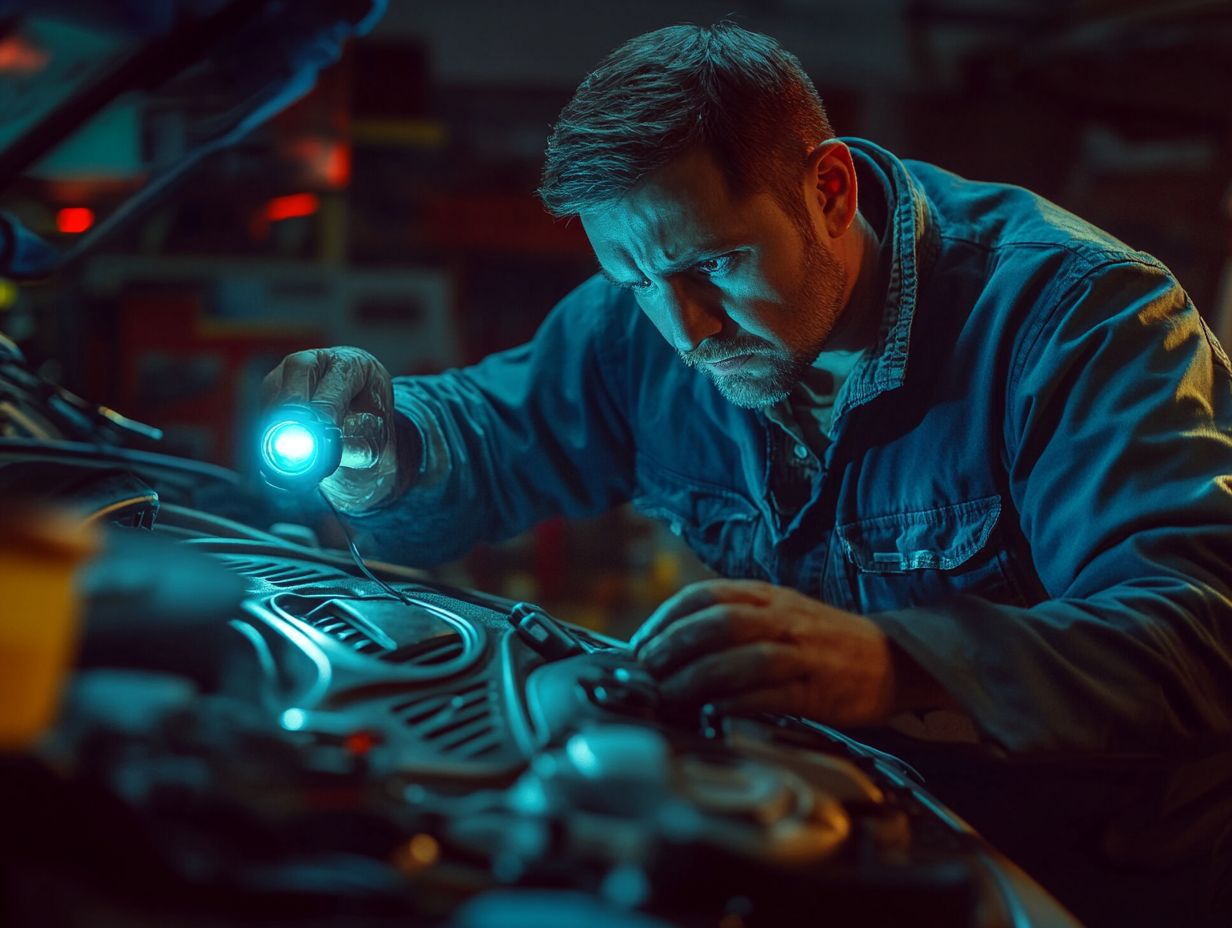
Regular maintenance is essential for the longevity and efficiency of your car’s HVAC system.
By implementing maintenance tips like routine cleaning and timely filter replacements, you can prevent many common issues before they arise.
Regular Cleaning and Maintenance
Regularly cleaning and maintaining your HVAC system can significantly enhance air delivery and prolong the life of key components, such as the part that helps keep it running smoothly, ensuring optimal performance.
To reap these benefits, engage in routine tasks such as:
- Changing air filters every one to three months. This helps keep the air clean and your system running efficiently.
- Inspecting and cleaning the condenser and evaporator coils.
- Checking for any blockages in the ductwork.
These specific cleaning routines promote steady airflow and prevent your system from overworking, which can lead to expensive repairs down the line.
Scheduling regular maintenance checks with a qualified technician can help identify potential issues early. This ensures your HVAC system operates efficiently while keeping your indoor space comfortable.
Replacing Filters and Other Components
Replacing filters and components of your HVAC system is crucial for ensuring clean air and optimal performance, especially in service vehicles that undergo heavy use.
Regularly replacing filters improves the air quality circulating within the vehicle and prevents the system from becoming clogged with dust and debris. This proactive approach helps maintain efficiency and can significantly reduce energy costs.
It s important to monitor and replace key components, like compressor mounts, which can wear from vibrations and constant pressure fluctuations. Ignoring these necessary replacements can lead to serious issues, jeopardizing the HVAC system’s functionality and the comfort of everyone on board.
When to Seek Professional Help
Knowing when to enlist professional help for your HVAC system is vital to prevent issues from spiraling out of control.
Recognizing the signs of serious problems allows you to make informed and timely decisions regarding necessary repairs.
Signs of Serious Issues
Act quickly if you notice signs of serious issues in your HVAC system, such as low refrigerant levels or compressor failure. Ignoring these critical indicators can lead to inefficient operation, resulting in soaring energy bills and a less comfortable environment.
Ongoing neglect can cause irreversible damage to key components, potentially leading to a complete system breakdown.
Watch for common additional symptoms, including:
- Unusual noises
- Inconsistent temperature control
- Frequent cycling on and off
If you let these warning signs go unaddressed, the consequences can escalate quickly, resulting not only in higher repair costs but also jeopardizing air quality and safety in your space. Taking action now can save you time, money, and a great deal of discomfort later on.
How to Find Your Ideal HVAC Technician

Choosing a reliable mechanic for your HVAC system is essential for ensuring quality repairs and maintenance, especially for service vehicles that depend on efficient heating and cooling.
A dependable technician accurately diagnoses issues and extends the lifespan of these crucial systems, ultimately sparing you from costly replacements.
To find an experienced professional, start by checking their credentials and certifications to confirm they have the necessary qualifications. Reading customer reviews is also beneficial, as this feedback highlights others’ experiences.
Consider their specialization in HVAC systems, ensuring they understand the specific needs of service vehicles. A knowledgeable mechanic can make a significant difference in achieving long-term efficiency.
Watch this quick guide to learn how to inspect your HVAC system!
Frequently Asked Questions
What are the key components of a car’s HVAC system?
The key components of a car’s HVAC system include the compressor, condenser, evaporator, expansion valve, and blower motor.
Why is it important to regularly inspect a car’s HVAC system?
Regular inspections help ensure that the system is functioning properly, which is important for maintaining a comfortable driving environment and avoiding costly repairs.
What should be checked during an inspection of a car’s HVAC system?
During an inspection, check the refrigerant levels, inspect the belts and hoses, test the compressor, and look for any leaks.
How often should a car’s heating, ventilation, and air conditioning (HVAC) system be inspected?
You should definitely have a professional inspect your car’s HVAC system at least once a year!
If you notice any problems, consider getting it checked more often.
What are some signs that a car’s HVAC system may need to be repaired?
Watch for weak airflow, strange noises, or unpleasant smells.
These are clear signs that your HVAC system needs attention.
Can I inspect my car’s HVAC system myself?
You can perform basic checks, like looking for leaks or testing the blower motor.
However, if you notice issues or feel uncertain, it’s best to let a professional handle it.

